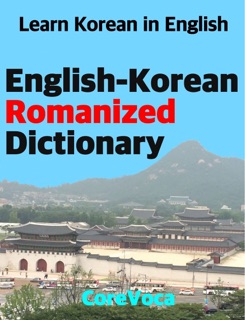This book lists approximately 9,000 core Korean words that can be searched with English equivalents. It’s ideal for learners of Korean as a second language who want to communicate more effectively and also for learners of English who know Korean.
Korean is written with two different scripts: Hangul and Hanjja (Chinese character). While Hangul is mostly used, Chinese characters should be used in order to clarify meaning since almost 80% of Korean language derives from Chinese characters.
English main entries are in alphabetical order and stressed syllables of them are in boldface type for clear communication in English. (The contrast between stressed and unstressed syllables is very important because it helps to create the rhythm of English.) Each main entry is followed by parts of speech label and the entry’s Korean equivalents. All Korean equivalent for main entries are written in both Roman letters and Korean writing (Hangul).
[example: area [n.] ji yeok 지역, myeon jeok 면적]
Since many Korean prefer to use foreign words in daily conversation, Korean pronunciation of foreign words are romanized in this book for better communication with Korean.
[example: picnic [n.] pi keu nik 피크닉, so pung 소풍]



















































